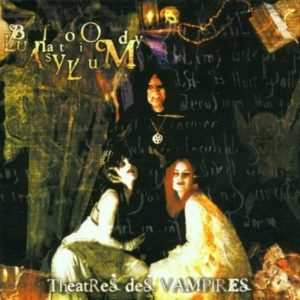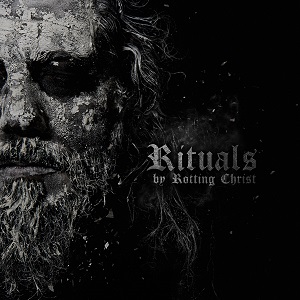by Helen Abbott and Caroline Ardrey
“My metal throat can speak all languages”. So claims Baudelaire in his threatening poem about the relentless passing of time, called The Clock. We took this phrase as our starting point when we began to explore the different kinds of musical languages Baudelaire’s poetry ends up in.

Metal music is an important genre for Baudelaire reception, and extreme subgenres such as death metal and black metal provide prominent examples of bands being inspired by Baudelaire’s darker texts. It seems to be an obvious link, perhaps even a cliché. When Baudelaire writes about the devil, evil, or death, surely that’s what’s going to attract black metal musicians. But the reality is more complex than that. There is never a simple link between a theme in a poem and why it gets chosen by musicians working in a particular genre. It’s true that black metal music privileges the subversive and alternative, and often explores obscenity, evil, and demonic figures, but it goes much further than that.
We have identified a cluster of settings of Baudelaire’s Les Litanies de Satan by seven black metal bands, in French, English, Norwegian, Russian, and Spanish.[1] None of the black metal reworkings of this poem are produced by French bands (the bands are Belgian, Greek, Italian, Mexican, Norwegian, and Russian). Like a lot of the songs we have uncovered through the Baudelaire Song Project, all of the groups manipulate Baudelaire’s text in various ways, but we have identified two techniques which are distinctive to the black metal aesthetic (we provide fuller schematic and summary analyses here).
- These bands de-emphasise the refrain ‘Ô Satan, prends pitié de ma longue misère!’ (O Satan, take pity on my endless misfortune!). The line appears 15 times in Baudelaire’s poem, interspersed by short verses of just 2 lines. In the black metal songs, the refrain is either suppressed altogether, or is put in a different place and repeated only a few times instead. They have gone for an alternative take on the characteristic black metal ideology of rebellion against religion. They exploit techniques which build intensity by alternating between music and text, either through extended musical interludes or through their choice of music samples (such as Beethoven’s Moonlight Sonata, used by Theatres des Vampires). Instead of directly appealing to Satan, they integrate him into their song design by oppositional sound techniques which pit the emblematic figure of the ‘alternative’ against any ‘traditional’ interpretation of what is good or evil.
- These bands manipulate Baudelaire’s text through their vocal performance styles. This kind of music is dominated by distortion and death growls. Abrasive and powerful at the same time, the guttural voice of the death growl is like the “metal throat” that Baudelaire speaks of in The Clock. But unlike the clock, who is a “sinister god” able to “speak all languages” and make himself understood by all, the performers in bands such as Rotting Christ or Ancient Rites make the words fairly unintelligible, irrespective of whether they are performing the text in French or English. We know that there is an underlying Baudelaire poem there, but we can’t really hear the specific words, because they got lost in an intense soundscape filled with subtle layers of vocal distortion.

Purists might say that this is a travesty – what are they doing to Baudelaire?! But our view is that the black metal settings we have uncovered reveal a multi-layered Baudelairean soundtrack that makes his poetry sound excitingly different. They use his texts in cleverly nuanced ways and show us how the beneath the surface of the cliché, the unconventional restructuring and the alternative performance styles produce a deep interpretation of Baudelaire as a spokesperson for the marginalised. Song settings of poems are much more than simple alloys of words and music. They do not do away with tradition, but they challenge us to rethink it. In black metal versions, Baudelaire’s poetry gets whispered, chanted, shouted, and growled in an exhilarating take on what poetic language can do to us.
—
For more information, check out our article which comes out later in 2018 with L’Esprit Créateur:
Abbott, H. and Ardrey, C., ‘“Mon gosier de métal parle toutes les langues”: Translations and Transformations of Baudelaire in Black Metal Music’, L’Esprit Créateur 58:1 (2018).
[1] Baudelaire’s poem ‘Les Litanies de Satan’ has also become famous in avant-garde/extreme electronica, such as tracks by Ruth White and Diamanda Galás.




